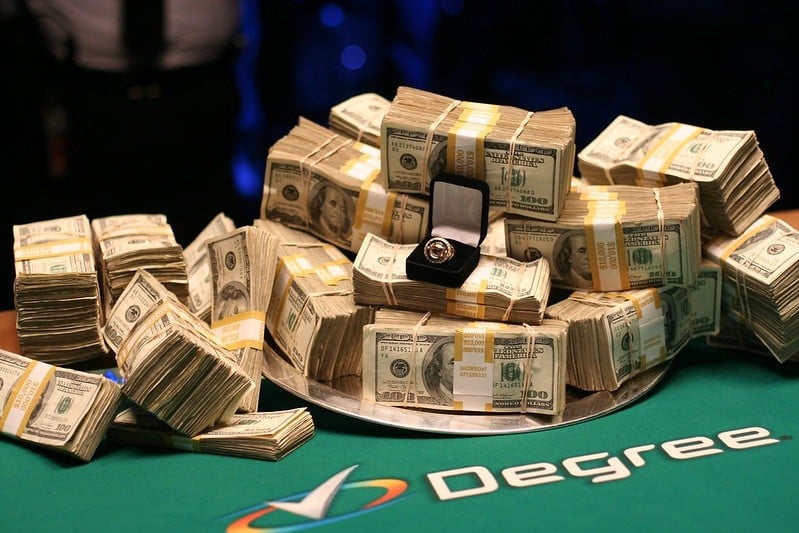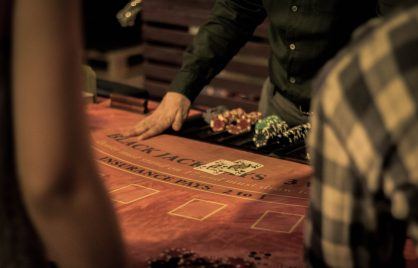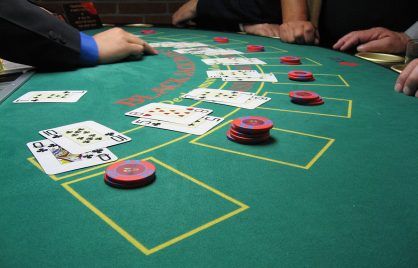The Top 6 Poker Myths That Players Still Believe In
Poker has seen a great surge of popularity over the past couple of decades. Almost overnight it became mainstream, with thousands of people all over the globe looking to make it big on the poker scene.
Although the golden years are somewhat behind us, the game still remains one of the favorite pastimes for many, and quite a few people have also managed to find success as professional players.
Although this kind of exposure was mostly good for poker, the great influx of fresh blood to the tables also helped fuel many myths and superstitions that seem to persist over the years.

In this article, we’ll look at the top 6 poker myths, explore their origins, and try to explain why these beliefs, for the most part, don’t have a stronghold in reality.
POKER MYTH #1: Poker is Gambling – Plain and Simple
Myth busted: Poker is a game of skill.

When the poker boom happened, people all over the world were impressed by the potential the game had to offer. You could literally become a millionaire with seemingly little effort and some good fortune.
Poker media, for obvious reasons, wanted to create an image that anyone can win, and anyone could become next Chris Moneymaker and take down the WSOP Main Event.
This “propaganda” attracted a great number of new players with a very basic understanding of the game.
To them, it was all gambling, and if you could get lucky in a few big pots, you had the same chances of winning a big tournament as anyone else. Professionals are just people on the right side of luck, and when their good fortune runs out, they’ll go bust.
This view of the game is anything but realistic.
There is no denying that poker involves an element of luck, but professional players use a different term to describe it – variance.
Over many hands, we’ll all get the same share of luck, more or less, so it isn’t about how often you win with pocket Queens against AK or how often your Aces get cracked. These things are all part of the game, but they aren’t the defining factor in one’s success.
The fact is that winning players aren’t winning because they’re luckier than the rest. They’re winning because they have a much better understanding of the game, underlying strategies, numbers, and everything else that comes into play.
They lose with pocket Aces as well, and they don’t always win when they flop a set, but they try to play every situation the best they can, losing less than an average Joe in some of these spots and winning some extra bets where most players would be happy to check and win what’s in the middle.
The best definition of poker, at least for a majority of its variations, is that it is the game of skill with some elements of luck in the short-term.
While anyone can win in a single tournament or have a good night at cash game tables, the players who have the skills and dedication to work will succeed in the long-run.
POKER MYTH #2: Playing Poker for a Living Is Easy – Anyone Can Do It
Myth busted: Being a poker pro requires particular skills and mental toughness – it is a very challenging career path.

Many people look at professional poker players and think they are living the dream.
They have no boss over their heads, they earn decent money, and they do all of that playing a card game comfortably seated in their house or traveling the world and enjoying the glory.
Some also believe that this life would be easy to emulate as you just need to be patient, wait for good cards, and the money will come in.
The reality, however, is quite different.
Playing poker for a living certainly has its perks, such as a certain degree of freedom when planning your time, seemingly limitless options to advance your career, and a big payday if you are good at the game.
However, that’s just one side of the coin that’s usually shown to us on TV shows and internet broadcasts.
Professional poker players have to be very disciplined and good at planning their time. While there is no one forcing them to play, they have to do it on a regular basis, and sometimes it can be very taxing.
On top of that, they have to dedicate numerous hours for studying and analyzing their play to reach at least moderate success.
So, they need a great degree of discipline to do all of this and earn enough money to cover expenses and enjoy the life that poker can bring.
Beyond this, professional players need to be mentally strong to battle the variance and don’t get overly affected by short-term results. While it may seem easy from a distance, this can be very hard to do when your livelihood depends on your results, and a bad run can really complicate your life.
So when you think about it, playing poker for a living is not as easy as it could look from the first glance.
POKER MYTH #3: The Pros Are Chasing One Big Win
Myth busted: It’s the pros’ income – why would they quit after one big win?

The idea about all professional players chasing one big win to get them set for life is closely connected to the first myth about poker being just another gambling game.
People looking from the outside often think differently about the game as many amateurs are dreaming about getting lucky in one huge tournament, i.e. basically winning the lottery.
True professionals have a completely different outlook.
They understand that playing poker for a living is a grind, and they don’t pay too much attention to individual results. Of course, most players are thrilled to book a high seven-figure score, but they don’t tend to look at it as an “exit” opportunity.
For professional players, this is their job. It is what they do, and it is what they love doing – at least for a great majority of them.
A single big score can be a great way to boost their bankroll and move up in stakes, but most pros don’t dream about giving up after winning the Main Event.
POKER MYTH #4: Top Pros Put Millions of Their Own Money on the Line
Myth busted: Many pros are playing on a stake, risking only a small portion of their own cash.

There is no denying that things have gone a bit wild with poker lately.
There’s been a surge of high roller tournaments with six, and even seven-figure buy-in amounts. On top of that, some of the televised cash games have millions of dollars scattered on the tables. We’ve all seen million dollar pots exchange hands and players hardly batting an eye.
For an average viewer, this feels like insanity. It’s hard to believe that even some of the best and richest poker players out there can risk such huge amounts of money in a single session or just one tournament.
So, it’s natural to wonder, how can they possibly afford it?
Once again, what we see on TV or online doesn’t paint a real picture of what’s going on behind the scenes. The fact of the matter is that most professional players aren’t risking millions of dollars of their own money.
Many of them are playing on a stake, which means that they only risk some of their own money while the rest is given by someone else in exchange for a percentage of potential winnings.
Additionally, many high stakes professionals exchange pieces between each other to reduce variance, so that even when they bust from a tournament, they still get a piece of someone else’s winnings.
Although many players still risk a lot of cash to play at the highest stakes, most of them find different ways to limit their exposure, and never put their bankroll on the line like in the movies.
POKER MYTH #5: You Can Practise With Play Money and Learn Poker
Myth busted: You can learn the rules when you play for free, but you won’t improve your strategy.

This is as far from the truth as it could possibly be, and probably is the worst advice you can ever get. The only thing you can learn in free games is rules, but no strategy whatsoever.
When people are playing without risking any of their money, they tend to behave completely differently and make random decisions.
Either shoving pre-flop with any two cards, going crazy post-flop by betting every time they have a chance, or choosing other ridiculous plays they can imagine. No matter what they do, they are very unlikely to be paying real poker.
All of these dynamics are far away from real games, so there is no way you can learn anything meaningful. Your opponents will be blindly clicking buttons, so you will not learn when to bet, what sizing to use, or how to read your opponents.
To be honest, if you start your experience in these games, you will not learn anything you need.
Obviously, that does not mean you have to jump into high buy-in games, but if you want to understand the dynamics and learn how to play poker, investing a buck or two will let you see the actual game, and learn much faster. It can make all the difference in the world.
POKER MYTH #6: Online Poker Is Rigged – You Get So Many Bad Beats
Myth busted: Major online poker sites are heavily regulated.

We saved the best ’til last.
The talk about online poker being rigged in one way or another has been around pretty much since online tables made their first appearance. Many people are convinced beyond any doubt that online games are somehow rigged to let players with worse hands win more often.
We have to agree that there were a few scandals over the years.
Like Absolute Poker superuser cases, where a specific player was able to see everyone’s cards, and a few computer programs caught playing in different networks, but this is just an exception from the rule.
We have to understand that there will always be someone trying to cheat where there is a lot of money on the line, but that doesn’t mean that poker as a whole is rigged. Quite the contrary.
The number one reason people get the impression online poker is rigged is that they get to see more hands per hour. Games play faster, and most players fire up more than one table at the time.
So, in your average online session, you’ll see three, four, five times as many hands as in a live tournament or cash game. Therefore, statistically, you’re also bound to see more bad beats as well.
People online, especially at small stakes, will often get involved with all sorts of trash hands that they might fold when playing live. Sitting behind their computer screens, they feel more comfortable gambling it up and trying their luck.
This is another reason why you’ll experience some brutal bad beats as people show up with hands that you can’t put them on.
On top of all this, major poker sites aren’t independent entities that get to do whatever they feel like. They undergo regular tests by governing bodies and independent companies to make sure everything is running the way it should.
There is plenty of evidence that online poker isn’t actually rigged, including large databases of hands from some of the top players that don’t show any deviations that go outside of normal parameters. For example, there is no single sizeable sample that shows pocket Aces or pocket Kings are losing money.
So, with all that in mind, we can only conclude that all the talk about online poker being rigged is just another myth.


